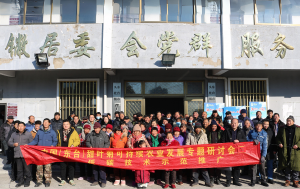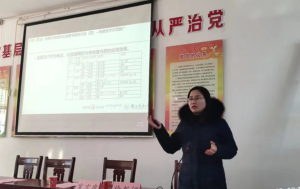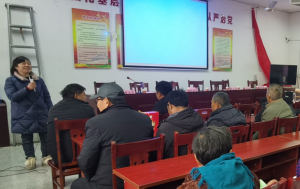Latest stevia workshop highlights environmental and community gains.
A science-led sustainable stevia agriculture programme to reduce the environmental impacts of stevia farming is also supporting the Dongtai community. That’s what Tate & Lyle’s on-going collaboration with environmental charity Earthwatch Europe (Earthwatch) and Nanjing Agricultural University (NJAU) in eastern China is all about. The programme supports Chinese stevia farmers, many of them women, and resulted in a 56% reduction of greenhouse gas (GHG) emissions1,2 and a boost to participating farmers’ productivity and livelihood.
The latest stevia farmer workshop, held in eastern China this January, showcased the impact of the on-going collaboration between Tate & Lyle, Earthwatch, NJAU and the local stevia farmers in Dongtai. On the day, over 90 local stevia farmers, academics and agricultural representatives from the Local Agricultural Bureau of Touzao Town and the Brother Stevia Co-operative gathered in Caopie Village, Dongtai, Jiangsu province to hear presentations about the programme’s results and testimonials from the participating farmers.
A Farmer Focus – the Partnership
As a world leader in plant-based ingredients for healthier food and beverages, Tate & Lyle is reliant on agriculture for its raw materials and is working responsibly to meet increased demands for future food production. We also partner with our customers to help meet growing consumer demand for sustainably sourced and produced food and drink.
The greenhouse gas emissions from our agricultural raw materials are a significant portion of our Scope 3 emissions so it makes sense for us to focus our sustainable agriculture programmes on farming of raw materials where we have the greatest opportunity to make a positive impact. One of these is stevia, a plant-based sweetener.
Earthwatch supports agribusinesses to find innovative ways to work with farmers to reduce their impact on and benefit from nature. In partnership with Earthwatch and NJAU, we developed an evidence-based programme to incorporate regenerative agriculture practices into existing farming practices to ensure that as the stevia market grows, sustainable growing practices are embedded consistently, and socio-economic benefits are maximised.
Since 2021, we have been working with local stevia farmers in China to reduce their environmental impact and boost their productivity, better connecting farmers, suppliers and customers with consumers. This ‘farmer first’ approach not only benefits individual smallholders – many of them women - but also the farmers’ families and the wider community.
Starting from a 2019 baseline, the results in 2023 showed that this pioneering partnership had led to a 56% reduction in greenhouse gas emissions from stevia farming.
How it All Began
In 2019, we started by conducting a lifecycle analysis to better understand the impact of stevia farming and inform our sustainable agriculture programme. A key component of the programme was not only focusing on the adoption of regenerative agricultural practices, but also ensuring the economic viability of the changes. The analysis showed how we could make a difference – with a focus on grower education and soil health.
Regenerative agriculture practices can improve soil health and restore nature. In turn, this helps combat climate change because improving soil health increases the amount of carbon captured from the atmosphere. Over time, these methods of farming contribute to the overall health of local ecosystems by improving watershed quality and supporting greater biodiversity - all good news for the farmers and the planet.
The Process
The initial pilot programme commenced with a small number of farmers in Dongtai, Jiangsu Province and focused on helping them understand soil health through regular testing with access to local experts to support changing farming practices based on the results. One key area of focus is fertiliser optimisation. In the first full year, we saw reductions in GHG emissions and improvements in metrics linked to local water quality. In 2022, we expanded the programme with more farmers from Gansu Province, West China who also signed up to the voluntary Tate & Lyle Stevia Supplier Sustainability Commitment – promising to reduce the impact of stevia farming on the environment.
A Model for Sustainable Farming
The 2023 results, measured from the 2019 timeline, have been impressive:
- a 76% reduction in fertiliser use
- a 56% reduction in GHG emissions
- a 94% decrease in terrestrial acidification which shows significantly improved soil health and biodiversity, and improved availability of nutrients to the stevia plant
- a 76% decrease in terrestrial ecotoxicity which measures the impact that farming inputs, such as fertiliser, have on land-dependent organisms and their environment
- a 77% reduction in freshwater ecotoxicity – (a measure of the impact that farming inputs like fertiliser have on freshwater dependent organisms and their environment)
Success Factors – a ‘farmer centric’ approach
Anna Pierce, Tate & Lyle’s Director of Sustainability and creator of the programme, believes: “Involving local farmers as experts early on and adopting a continuous cycle of feedback has enabled us to build trust locally. Farmers can see the results for themselves, especially that their crops can now better withstand the effects of climate change.”.
The Workshop - presenting, discussing, feeding back
In January, the stevia workshop was opened by the Brother Stevia Co-operative and a local agricultural officer. A Henan Science and Technology College academic followed with a presentation about the effects of slow-release fertiliser on stevia. Xu Xin Juan (pictured to the right) presented the effects of slow release fertiliser on stevia and her studies show that using slow-release fertiliser not only benefits higher leaf yield but also balances soil fertility, improving the environmental and economic impact of stevia production.
First-hand Views from Participating Farmers:
As pictured on the left, a farmer shares her experience of the sustainable stevia programme, “I have participated in the sustainable stevia programme for three years. I think it’s a good thing that benefits our income, soil and environment.”
“I didn’t know anything about the slow-release fertilisers or their benefits in stevia cultivation before joining the sustainability programme.”
The farmers’ comments also focused on wider social and economic benefits for the community. One explained: “Very few young people stay in rural areas for farming, labour shortages are really common, but using the slow-release fertiliser is less labour intense which makes it easier for me.” Another said: “Since participating in the sustainability project and workshop, I have felt that we have a strong science and technology team who support us.”
Looking Ahead
The workshop also saw Professor Luo Qingyun from NJAU outline next steps. Explaining that preliminary results revealed that slow-release fertiliser had obvious efficiencies, saving on the amount of fertilisers used, labour needed and reducing stevia diseases, he stressed that there was still room for further improvement in fertilisation methods and dosage.
“In response to climate warming”, he said, “the next task of the Sustainable Stevia Agriculture Programme is to explore the feasibility of the combined use of cover crops and slow-release fertilisers to reduce field air humidity, fertiliser use and greenhouse gas emissions, enhance plant resilience to dry and rainy weather, and increase farmer income diversity. We welcome our growers’ participation to further enhance the sustainability of stevia cultivation.”
Thank you to everyone who attended and to everyone who made the workshop possible!
References
1. Per pound of stevia rebaudioside A produced.
2. From a 2019 baseline

Our purpose
Our purpose of Transforming Lives Through the Science of Food guides every action we take and every decision we make. Learn about the three pillars of our purpose.


